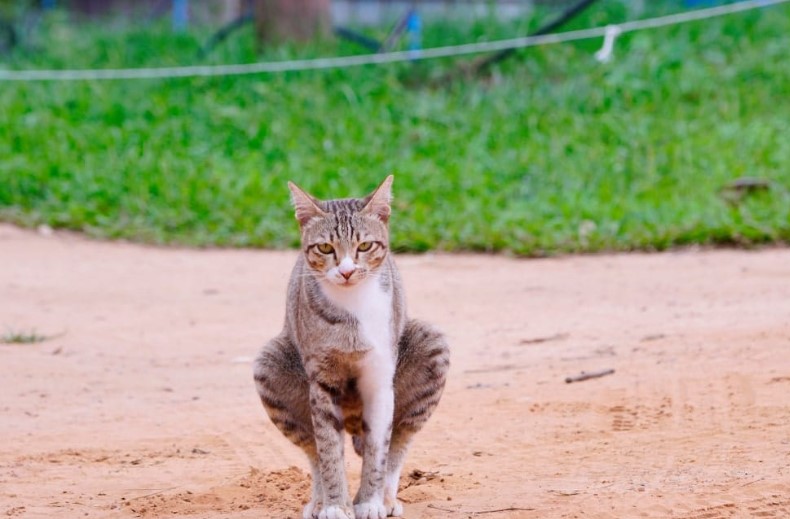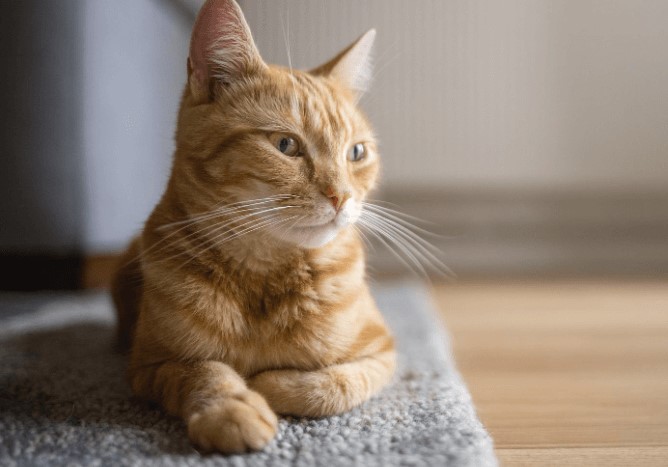If your cat poopers a stinky odor, it could be because of bacteria, intestinal parasites, or other causes. This article will help you determine the cause of the smelly poop. Among the reasons why your cat poop smells bad, you may find wild-caught food, bacteria, or parasites. A veterinarian can run tests to determine the exact cause of the smelly poop.
Have you noticed a foul odor coming from your pet’s stools lately? Does the odor make you gag, or faint before you can get to the bathroom while taking care of your pet? I know this may sound extreme but sometimes it happens. If your answer is NO, then chances are either your pet hasn’t had a bowel movement in the last week or so, or you have developed a compromised sense of smell over time.

Why Cat’s Poop Smells So Bad
Why Cat Poop Smells So Bad? Your cat’s bowel movement may be the most common cause of foul smelling poop. Cats’ feces are made up of a mixture of volatile organic compounds and fatty acids. The components of cat poop include ammonia, sulfur, nitrogen, and other aromatic gases. They differ in smell and composition depending on the content of the diet. In general, cats should get a higher protein diet.
Some causes of foul-smelling cat poop include diet changes and certain medical conditions. Some cases can be resolved with a simple diet adjustment. Other causes include bacterial infections and certain medical conditions. Often, cats with this problem will have diarrhea or other gastrointestinal issues. If your cat is experiencing foul odors in its feces, you should visit your veterinarian to diagnose the underlying problem.
If your cat isn’t pooping, consider a change in diet. Sometimes, bad-smelling poop may be caused by spoiled food. Intestinal parasites can also cause foul-smelling stools. In rare cases, your cat may be suffering from a digestive disorder. The veterinarian will likely run tests to determine if your cat has a food allergy or a more serious medical issue.
Diet as a cause of smelly stool in cats
A change in diet could be the cause of smelly stools in cats. Occasionally, bacteria in the stool may be the culprit. Some types of food, especially wild-caught meats, can harbor parasites that cause unpleasant odors in the stool. To rule out bacterial infections, consult a veterinarian. Other possible causes include intestinal parasites, certain medical conditions, or infections.
A sudden change in diet can also lead to smelly stools in cats. While some cats tolerate this change, most will experience digestive upset, including odorous stools. Luckily, this will usually resolve itself over time, but if the symptoms persist or your cat stops eating, it’s best to consult a veterinarian. Your veterinarian can prescribe a special diet that suits your cat’s needs.
Symptoms of inflammatory bowel disease include a fecal odor and a foul odor. Inflammatory bowel disease can also lead to smelly stools, particularly if the pet consumes meat, fish, or chicken. Food allergies can result in an upset gut and foul poop. Other conditions resulting in smelly stools include parasites, especially if your cat is kept outdoors. Common parasites include roundworms, coccidia, and Tritrichomonas spp. Treatments for these types of bacterial infections are long and costly.
Bacteria as a cause of smelly stool in cats
Many different causes of smelly stools in cats can be traced to bacterial infections. Intestinal parasites and wild-caught food can infect your cat, making it more susceptible to bacterial infections. A trip to the veterinarian can rule out any serious problems and recommend a course of treatment. Inflammatory diseases such as cystic fibrosis and intestinal worms can also cause smelly stools in cats.
The bad smell in your cat’s stools can be attributed to several different reasons, including bad food, excess gas, and diarrhea. There are several kitty disorders that can cause smelly stool, but most will resolve on their own with a change in diet. However, it’s important to see a veterinarian if you notice any sudden, intense, or persistent smell. If your cat has diarrhea, it is especially important to seek medical care right away.
The symptoms of bacterial infection are more apparent if the cat has diarrhea in a hospital or another condition. Sudden diarrhea may be associated with blood poisoning. If the infection is prolonged, it can lead to miscarriage in pregnant cats. In addition to smelly stools, cats with calicivirus can suffer from pneumonia or conjunctivitis. Your veterinarian can diagnose the disease with a laboratory examination of the cat’s feces.
Parasites as a cause of smelly stool in cats
Cats can have a number of different health conditions, including intestinal parasites. Smelly stools can also indicate a bacterial infection, which can be life-threatening in its most severe forms. However, the most common cause of smelly stools in cats is intestinal parasites, which can be caught in several ways, including from fleas and other infected cats.
Giardia is one common parasite in cats and can cause sudden, foul-smelling diarrhea. It’s spread by contact with the feces of infected cats. Treatment for this disease involves oral medications and thorough cleaning of the environment. Infection with Giardia is relatively rare, but the symptoms can be extremely unpleasant. This condition is treatable, but it’s a good idea to consult a veterinarian immediately if your cat is experiencing unpleasant odors in its droppings.
In cats, the fecal matter may have a metallic odor. It could also be red or brown, and odour may be excessive. Smelly stools in cats usually pass on their own in a few days, but you should still visit a veterinarian if your cat suddenly develops a bacterial infection. Regardless of the cause, your cat should visit a veterinarian if you notice a smelly stool in their stools. It could be a sign of a digestive disorder, parasites, or a poor diet. If you notice your cat is suffering from a disease, your cat may be experiencing a high level of stress, which can affect the gut.
Digestive disorders as a cause of smelly stool in
The main causes of stinky poop in cats are intestinal parasites and bacterial overgrowth. However, some foods may also be the source of unpleasant odor, so it is important to consult with your veterinarian to rule out bacterial overgrowth. Symptoms of intestinal overgrowth include excessive gas, diarrhea, and inflamed intestines. Digestive disorders in cats also result in bloating, gas, and smelly poop.
Certain medications and vitamin and mineral supplements are known to cause this condition in cats.
Some digestive disorders are more serious and difficult to diagnose, so a vet is the best place to go for advice. Your cat may be suffering from a food allergy. Some cat foods contain meat, fish, and poultry that can cause a poop that smells bad. If you suspect that your cat is suffering from one of these digestive disorders, you should contact your veterinarian immediately. It is crucial to find out the cause of the smelly poop before you try to treat it yourself.
Food Intolerances
If your cat’s poop smells horrible, chances are they have a digestive issue. While changing the food they eat can solve this problem, you might have to seek veterinary treatment for a more serious condition. If you do not have a medical condition, your veterinarian can prescribe medications to alleviate your cat’s symptoms. Food intolerances can also be the cause of a cat’s bad poop.
A recurring bout of diarrhea in cats is a sign of a larger problem. Besides a bacterial infection, your vet may recommend a fecal exam or other lab tests to diagnose the problem. For this type of problem, your cat should stay indoors and receive regular veterinary care. Another common cause of foul-smelling poop in cats is intestinal parasites. Infections are often passed from mother to kitten. Alternatively, adult cats can contract worms from fleas, other infected cats, or other animals.
While most odorous poop in cats is caused by bacteria and fungi, some cats may also have a reaction to a specific food. This can result in a foul-smelling poop for several days, and in some cases, blood and vomit can also appear. In addition to this, introducing a new food to your cat’s diet can cause the poop to smell so bad. Introducing a new food gradually can help your cat adjust to the new food. Make sure to introduce it in small doses, up to 10% per day, until you are comfortable with the change.
Medications
While you may not be thinking about prescription medications for bad cat poop smell, you may be surprised to know that certain medications can cause bad odor in your pet’s feces. For example, certain antibiotics and drugs for humans can lead to a strong, smelly cat’s poop. But what are the causes of bad cat poop smell? If your pet consistently produces a foul odor, these medications could help.
Sometimes, smelly cat poop is the result of your cat defecating outside of the litter box or is not covering its stool when in the litter box. While poop smell is a symptom of an underlying health problem, a bad cat’s poop may be a sign of something more serious. If you are concerned that your cat is suffering from a health problem, visit your veterinarian for a full examination.
Symptoms of bad cat poop smell include a yellow or orange colored poop, a metallic odor, and loose or oily stools. It is important to seek medical attention if you notice your cat pooping smelly. The problem is usually not life-threatening unless your cat has a more serious underlying condition. If you notice your cat pooping more than once a day, it is important to consult with a veterinarian immediately.

Poor-Quality Litter
If your cat has recently started peeing outside the litter box, it may be because your litter box isn’t the cleanest place in the world. After all, you’re probably tired of smelling like cat pee. Thankfully, there are several ways to manage the smell from your cat litter box. One simple way is to buy a clumping litter. This type of litter gets rid of urine on a daily basis, while non-clumping litter collects the urine and smells after two to seven weeks.
Another way to solve the issue is to buy an unscented litter. You should avoid litter with additives like baking soda or carbon. Neither of these are good for your cat. These additives mask bad smells for human beings and are only necessary if you want to sell your litter. If you have a very sensitive kitty, use an unscented litter instead. If you can’t find an unscented litter, try a synthetic silica-based litter.
There are food related causes of a smelly stool in cats. Be sure to monitor the amount of foods your cat consumes that are high in fat. If you add a new brand of food, be sure to transition slowly to avoid tummy upsets. As always with your cat’s health, check with your vet if you have any concerns.








